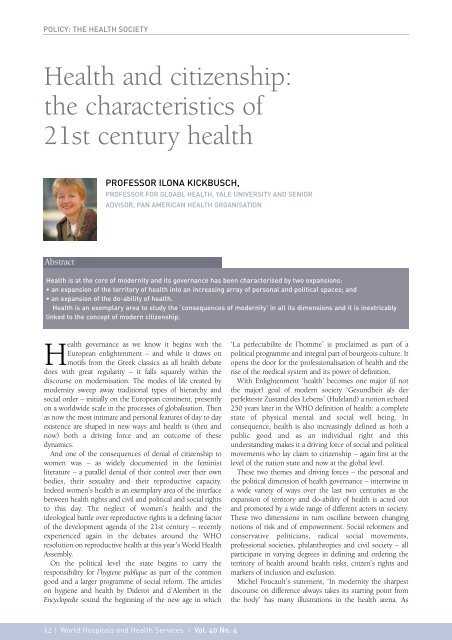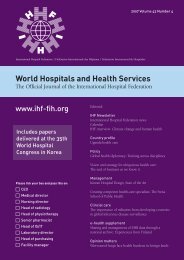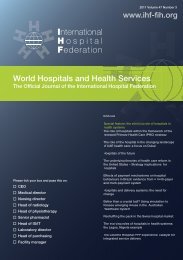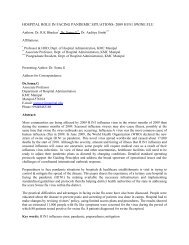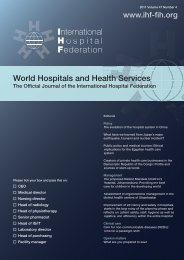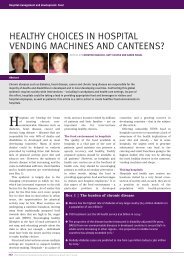World Hospitals and Health Services - International Hospital ...
World Hospitals and Health Services - International Hospital ...
World Hospitals and Health Services - International Hospital ...
You also want an ePaper? Increase the reach of your titles
YUMPU automatically turns print PDFs into web optimized ePapers that Google loves.
POLICY: THE HEALTH SOCIETY<br />
<strong>Health</strong> <strong>and</strong> citizenship:<br />
the characteristics of<br />
21st century health<br />
PROFESSOR ILONA KICKBUSCH,<br />
PROFESSOR FOR GLOABL HEALTH, YALE UNIVERSITY AND SENIOR<br />
ADVISOR, PAN AMERICAN HEALTH ORGANISATION<br />
Abstract<br />
<strong>Health</strong> is at the core of modernity <strong>and</strong> its governance has been characterised by two expansions:<br />
• an expansion of the territory of health into an increasing array of personal <strong>and</strong> political spaces; <strong>and</strong><br />
• an expansion of the do-ability of health.<br />
<strong>Health</strong> is an exemplary area to study the ‘consequences of modernity’ in all its dimensions <strong>and</strong> it is inextricably<br />
linked to the concept of modern citizenship.<br />
<strong>Health</strong> governance as we know it begins with the<br />
European enlightenment – <strong>and</strong> while it draws on<br />
motifs from the Greek classics as all health debate<br />
does with great regularity – it falls squarely within the<br />
discourse on modernisation. The modes of life created by<br />
modernity sweep away traditional types of hierarchy <strong>and</strong><br />
social order – initially on the European continent, presently<br />
on a worldwide scale in the processes of globalisation. Then<br />
as now the most intimate <strong>and</strong> personal features of day to day<br />
existence are shaped in new ways <strong>and</strong> health is (then <strong>and</strong><br />
now) both a driving force <strong>and</strong> an outcome of these<br />
dynamics.<br />
And one of the consequences of denial of citizenship to<br />
women was – as widely documented in the feminist<br />
literature – a parallel denial of their control over their own<br />
bodies, their sexuality <strong>and</strong> their reproductive capacity.<br />
Indeed women’s health is an exemplary area of the interface<br />
between health rights <strong>and</strong> civil <strong>and</strong> political <strong>and</strong> social rights<br />
to this day. The neglect of women’s health <strong>and</strong> the<br />
ideological battle over reproductive rights is a defining factor<br />
of the development agenda of the 21st century – recently<br />
experienced again in the debates around the WHO<br />
resolution on reproductive health at this year’s <strong>World</strong> <strong>Health</strong><br />
Assembly.<br />
On the political level the state begins to carry the<br />
responsibility for l’hygiene publique as part of the common<br />
good <strong>and</strong> a larger programme of social reform. The articles<br />
on hygiene <strong>and</strong> health by Diderot <strong>and</strong> d’Alembert in the<br />
Encyclopedie sound the beginning of the new age in which<br />
‘La perfectabilite de l’homme’ is proclaimed as part of a<br />
political programme <strong>and</strong> integral part of bourgeois culture. It<br />
opens the door for the professionalisation of health <strong>and</strong> the<br />
rise of the medical system <strong>and</strong> its power of definition.<br />
With Enlightenment ‘health’ becomes one major (if not<br />
the major) goal of modern society ‘Gesundheit als der<br />
perfekteste Zust<strong>and</strong> des Lebens’ (Hufel<strong>and</strong>) a notion echoed<br />
250 years later in the WHO definition of health: a complete<br />
state of physical mental <strong>and</strong> social well being. In<br />
consequence, health is also increasingly defined as both a<br />
public good <strong>and</strong> as an individual right <strong>and</strong> this<br />
underst<strong>and</strong>ing makes it a driving force of social <strong>and</strong> political<br />
movements who lay claim to citizenship – again first at the<br />
level of the nation state <strong>and</strong> now at the global level.<br />
These two themes <strong>and</strong> driving forces – the personal <strong>and</strong><br />
the political dimension of health governance – intertwine in<br />
a wide variety of ways over the last two centuries as the<br />
expansion of territory <strong>and</strong> do-ability of health is acted out<br />
<strong>and</strong> promoted by a wide range of different actors in society.<br />
These two dimensions in turn oscillate between changing<br />
notions of risk <strong>and</strong> of empowerment. Social reformers <strong>and</strong><br />
conservative politicians, radical social movements,<br />
professional societies, philanthropies <strong>and</strong> civil society – all<br />
participate in varying degrees in defining <strong>and</strong> ordering the<br />
territory of health around health risks, citizen’s rights <strong>and</strong><br />
markers of inclusion <strong>and</strong> exclusion.<br />
Michel Foucault’s statement, ‘In modernity the sharpest<br />
discourse on difference always takes its starting point from<br />
the body’ has many illustrations in the health arena. As<br />
12 | <strong>World</strong> <strong><strong>Hospital</strong>s</strong> <strong>and</strong> <strong>Health</strong> <strong>Services</strong> | Vol. 40 No. 4


